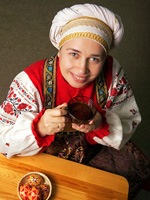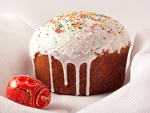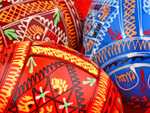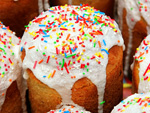Easter in Russia
 Easter
is the day of the resurrection of Christ. The holiday came to Russia
from Byzantium together with Russia’s christening in the end of the 10th
century. Since then, this Christian holiday has been widely celebrated
all over Russia.
Easter
is the day of the resurrection of Christ. The holiday came to Russia
from Byzantium together with Russia’s christening in the end of the 10th
century. Since then, this Christian holiday has been widely celebrated
all over Russia.The day before Easter all churches hold night services and organize religious processions around churches. By that time, kulich, the traditional holiday baking symbolizing the body of Christ, had been already baked and Easter eggs painted. The morning starts from visiting neighbors and giving away Easter eggs. The common phrase you can hear on that day is: "Khristos voskres!" (Christ is risen!), which is to be followed by "Voistinu voskres" (Truly He is risen! This traditional greeting followed by hugging and triple kissing is called "kiss of peace". Christian Easter feast lasts seven days and is called the Holy Week or Sedmitsa.
Easter is the day of abundant food. After the Great Lent the best and the most delicious food is on tables. The main meals are ritual ones: Easter cakes, kulich and painted eggs.
Egg, which is traditionally painted red and its shades, was the mandatory attribute and the symbol of Christian Easter in the 12th century. High and round kulich with cross image on top has always been baked from yeast dough. It is believed that quality Easter bread ensures well-being of the family. It is to be cut across, keeping the top intact to cover the rest of the Easter cake.
And, of course, the old Russian tradition of Easter is to send and deliver gifts to poor families, relatives and strangers, orphanages, hospitals and prisons. Wondering beggars are not an exception: people say that "from Easter to the Ascension Christ with the Apostles travel on earth testing everyone for mercy and kindness".


